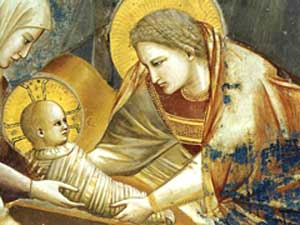
The Christmas mystery is more than just
information about God. It’s more than just a new piece of data to be stored away
on our theological hard-drive, because what we need from God is more than just
information. The Letter to the Hebrews is probably one of the boldest and most
unambiguous statements possible about what is so unique and special about the
Christmas mystery: “In times past, God spoke in partial and various ways to our
ancestors through the prophets; in these days, he has spoken to us through the
Son…” In other words, God has always been communicating with humanity, in any
number of ways; but what we need from God is more than just information. The
climax of the communication is the sending of the Son, so that we can grasp the
fact that really knowing God, really responding to God’s Word of promise and
life, is a matter of relationship. It’s all about becoming God’s child.
Relationship is what is unique about Christmas; the new possibility for each of
us to be related to God as Jesus was and is. The Source whom Jesus called
Father is now our Source, our Father! We are adopted children of God; taken into
the very life of the Trinity.
The Incarnation is God’s move into need and
dependency - into our need and dependency. The incarnation of God is revealing
and communicating a reality that is as much about us, as it is about God. The
words of the traditional Christmas carol Oh, Holy Night come to life in a
whole new way: “Long lay the world in sin and error pining till he appeared,
and the soul felt its worth.” God, in Jesus, needs our care, our love.
Jesus Christ became human, really human.
And he wants and needs the love of each and every one of us. And in our
realization of this and in our responding to God’s divinely human need and
desire, we awaken to and realize our own inestimable worth. And at the same
time, we realize the inestimable worth of every creature God has created. And
it should be no surprise to us that when we seek to encounter Christ today, we
find him in the needy, vulnerable, the broken and helpless of our world. The
Christ we meet in the vulnerable is the child Christ and none other. The
hungry, the homeless, the thirsty, prisoners, refugees, the sick and abandoned.
And today, most especially, children themselves. All these carry in their
bodies the vulnerability and dependency of the Christ Child who continues to
wait for our swaddling efforts, who ceaselessly continues to desire and need
our loving care. Every human being we encounter, in fact, every piece of
creation awaits our swaddling care and concern because the Word really did
become flesh.
Detail of a fresco by Giotto. Excerpts from Abbot Damian's homily for Christmas.
Detail of a fresco by Giotto. Excerpts from Abbot Damian's homily for Christmas.
